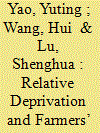| Srl | Item |
| 1 |
ID:
192398


|
|
|
|
|
| Summary/Abstract |
The fact that firms seek political connections through revolving-door recruitment is widely acknowledged around the world. Using an original database including the information of listed firms' board members and parcel-level land transaction records, this paper documents how revolving-door recruitment makes firms stand out in China's land market. We show that firms with revolving-door recruitment receive special deals in land transactions, which are simultaneously reflected in the quantity and price of land. Specifically, connected firms buy more parcels and larger areas of land in the primary land market. Due to the particularity of industrial land, price discounts are only identified for commercial and residential land, while not for industrial land. Measuring economic activity by night light intensity, we find no evidence that land transaction under the influence of political connections has a negative impact on economic activity on land. Our research advances the understanding that the state-business relationship is an essential factor in resource allocation in an emerging market with government intervention.
|
|
|
|
|
|
|
|
|
|
|
|
|
|
|
|
| 2 |
ID:
181880


|
|
|
|
|
| Summary/Abstract |
Land expropriation is a common source of grievances and resistance from farmers in China. Based on survey data, we propose that farmers’ sense of relative deprivation is one of the causes. Our study focuses on compensation distribution in villages, where village collectives are the reference for comparison. Relative deprivation is measured by the ratio of farmer compensation to the standard government compensation; the gap between these is roughly the compensation retained by village collectives. The outcome variable is farmers’ willingness to participate in village governance. The empirical test is based on 2017 data from the Chinese Family Database of Zhejiang University and compensation standards data collected by the authors. Nearly 75% of respondents received less than standard compensation, which indicates widespread relative deprivation. And the greater the relative deprivation of farmers, the more willing they are to participate in village governance.
|
|
|
|
|
|
|
|
|
|
|
|
|
|
|
|